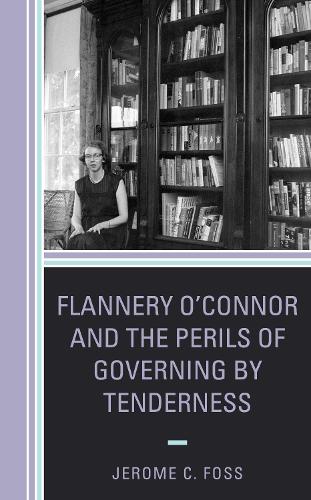
Flannery OConnor and the Perils of Governing by Tenderness
(Paperback)
Available Formats
Publishing Details
Flannery OConnor and the Perils of Governing by Tenderness
By (Author) Jerome C. Foss
Bloomsbury Publishing PLC
Lexington Books
19th October 2020
United States
Classifications
Professional and Scholarly
Non Fiction
Politics and government
Film: styles and genres
813.54
Physical Properties
Paperback
200
Width 150mm, Height 222mm, Spine 15mm
304g
Description
Flannery OConnors fiction continues to haunt American readers, in part because of its uncanny ability to remind us who we are and what we need. Fosss book reveals the extent to which OConnor was a serious reader of the history of political philosophy. She understood the ideas upon which the American regime rests, and she evaluated those ideas from the standpoint of both faith and reason. Fosss book explains why OConnor feared that the modern habit to govern by tenderness would lead to terror.
After a thorough account of her familiarity with the history of political philosophy, Foss shows how the works of Plato, Aristotle, Saint Augustine, Saint Thomas Aquinas, Machiavelli, Locke, Rousseau, and Nietzsche inform OConnors stories. This does not mean that OConnor was writing about politics in the narrow sense. Her vision was deeply theological, and she carefully avoided topical stories that promote social agendas. Her concern was with the health of the American regime more broadly, insofar as the manners of a regime affect citizens attitudes toward religion. OConnor does not present a political theory of her own, but as Foss argues, she was a political philosopher in the original sense of the word. Her stories give clear accounts of her political wisdom. Foss further shows the continued relevance of her wisdom in age dominated by abstract modern theories, such as that of John Rawls.
Reviews
One temptation in analyzing OConnor is to use her work to demonstrate the Catholic worldview that mysteriously informs her fiction, a tendency both encouraged and thwarted by her own wry, acute commentaries on fiction and faith. In Flannery OConnor and the Perils of Governing by Tenderness, Foss makes this risk an opportunity to summarize Augustinian and Thomistic theology, especially the latters synthesis of Christian revelation with classical notions of reason and political life. * CHOICE *
One of the cardinal virtues of Fosss work is the attention he pays to OConnors correspondence, papers, and personal library. . . Foss clearly spent a great number of hours going through these documents with detail, scrutinizing annotations, highlights, and marginalia to offer readers a sense of precisely what sources OConnor was familiar with during the course of her life. . . . In all, Flannery OConnor and the Perils of Governing by Tenderness should be considered by any lover of OConnor and the philosophic tradition, or more broadly, any friendly critic of American democracy and its liberal order. Its prose is accessible to the intelligent and patient reader, and Foss does a good job summarizing the stories he leverages so that one need not be an OConnor expert to appreciate his points. He whets the appetite for OConnors storytelling, rather than filling it, sending readers back to the source so that they can rediscover her anew. In this regard, Flannery OConnor and the Perils of Governing by Tenderness seems to carry forward OConnors intent of helping the disquieted modern American reader better understand himself and the political community in which he lives. * VoegelinView *
Readers may be wary of a book that baptizes a literary saint into a political fount; however, Foss does not align Flannery OConnor with any ideological camp or reduce her fiction to morals on political life. Rather, he mines her stories for obvious gems that we too often overlook: references to Machiavelli and Heidegger, for instance, that bring OConnor into ongoing conversations about the role of human beings within their polity. In Foss reading, OConnor is still a hillbilly Thomist, but her religious philosophy has much to say about our politics. -- Jessica Wilson, John Brown University
Fosss study is a welcome breath of fresh air and an important addition to OConnor studies, and none too soon. In our present age of competing political ideologies, this book serves a dual aim for two kinds of readers: to introduce those familiar with OConnor to a deeper appreciation of the political significance of her work; and to introduce those more interested in political philosophy to the corrective that OConnors emphasis on incarnational truth demands. Fosss excellent study addresses an obvious lacuna in OConnor scholarship (how could we have missed it), and at the same time reminds us that, as theories go, they only finally matter if they translate to the world of flesh and blood. As Foss rightly suggests in his assessment of OConnor, to separate concerns of faith from the concerns of the polis does an injustice to both. -- Michael Bruner, author of A Subversive Gospel: Flannery O'Connor and the Reimagining of Beauty, Goodness, and Truth
By revisiting Flannery OConnors eclectic bookshelves and acknowledging her expansive intellect, Dr. Foss convincingly argues that OConnors stories project a significant understanding of the history of political philosophy, from Plato to Heidegger. OConnors well-documented quest to understand her faith through fiction brings her in stories into dialogue with classical, medieval, and modern schools of political thought. A valuable read. -- Christine Flanagan, author of The Letters of Flannery OConnor and Caroline Gordon
Author Bio
Jerome C. Foss is associate professor of politics at Saint Vincent College.
